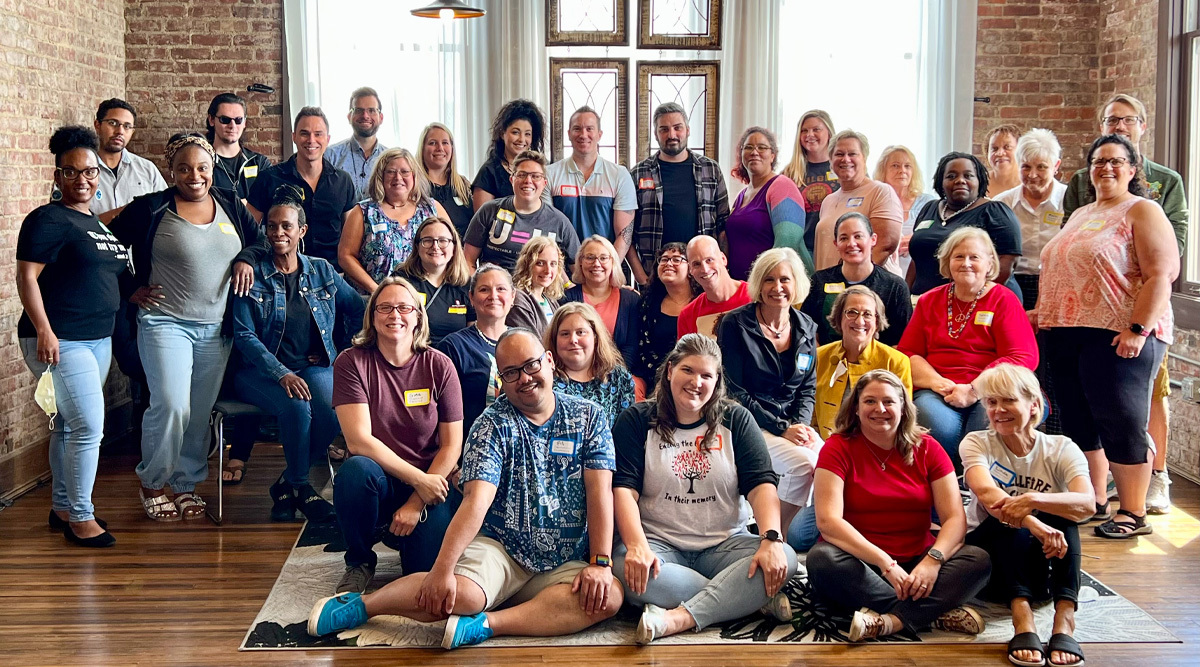As IU Health’s LifeCare celebrates three decades, one long-time nurse practitioner talks about the changes in testing, education, and medical care related to HIV.
By IU Health Senior Journalist, T.J. Banes, tfender1@iuhealth.org
She still wears her original IU Health employee badge from 15 years ago. For Martha “Marti” Greenwald, it’s a badge of honor. Over the years, she has come to know many of her patients and sees some of them more often than others.
“It’s not unusual to ask: ‘How’s the family? How’s your dog,’” said Greenwald.
She began working with IU Health in 1977 at University Hospital in Renal and pulmonary ICU. She also has experience working in hematology/oncology, and home care. She worked at Riley Hospital for a time and after completing her master’s degree, she learned of an opening in the HIV Research Department.
“I would come to LifeCare and look for patients who would fit our research studies, Throughout the five years I was there I would review patient histories,” said Greenwald. Over time, she felt she could be more comprehensive in her scope of care working alongside patients. At the time she joined LifeCare, she was one of three nurse practitioners, serving about 300 patients. Now the team includes five nurse practitioners serving about 1600 patients, making it one the largest HIV medical providers in the state.

Located in IU Health Methodist Hospital, LifeCare staff includes nurses, infectious disease physicians, licensed social workers, clinical pharmacists, psychiatrists and other support staff. Together they offer confidential HIV testing, health assessments and physical exams, comprehensive treatment plans, lab work, immunizations and vaccinations, and access to specialty and community referrals. LifeCare also offers HIV prevention services like pre- and post-exposure prophylaxis.
To commemorate the 30th anniversary, LifeCare team members have set a goal to raise $30,000 for the 2022 AIDS Walk, September 25.
Over the years, those team members have extended services to family members, caregivers, spouses and domestic partners. The care has expanded from end-of-life care to focus on testing and preventing the human immunodeficiency virus (HIV). A primary focus has evolved from coping with a diagnosis to living with a diagnosis.
Clients come to LifeCare from all walks of life – all genders, sexual orientations, and ethnicities.
“Over the years our patients would come readily because their perceptions were that they might be stigmatized by other providers who didn’t understand the disease process so we were providing a lot of primary care,” said Greenwald. “We will continue to do that if there is no other means of primary care, but we’re now seeing more and more clients who are finding connections with primary care providers.” A third of LifeCare’s clients are 18-35 years old, she said. “Then there is a hefty middle age population which is wonderful because at one point, they didn’t expect to live that long.”
Greenwald credits advances in research and science with that longevity. Instead of taking 25-30 tablets around the clock to manage the virus, patients can take one co-formulated dose daily. Last year, the FDA approved a monthly injectable drug, Cabenuva, to treat adults 18 and older. In February 2022, the FDA expanded the label for the medication to allow for bi-monthly administration. Patients now have an alternative option to daily antiretroviral therapy.
“The scope of care has changed. I often tell patients, ‘it’s not HIV that will be your demise. It may be smoking, diabetes, or high blood pressure.’ That’s where the holistic care comes in,” said Greenwald. Another change over the years has been insurance coverage for prophylaxis treatment. “If you’re in a high risk group, you can take a daily tablet to reduce your chance of transmission by about 96 percent,” said Greenwald.
A few other advancements include:
- Early 1990s: IU Health created an AIDS Task Force to address specific patient needs.
- Mid-1990: LifeCare received funding from the Indiana State Department of Health for Care Coordination and began weekly testing at Arsenal Technical Teen Clinic.
- Early 2000: LifeCare received its first Direct Emergency Financial Assistance funding from the AIDS Fund.
- 2016: A health equity program called Prevention Access Campaign (PAC) launched “U=U” (undetectable=untransmittable). The action has united HIV advocates, activists, and researchers with the common message: “People living with HIV who achieve and maintain an undetectable viral load – achieved by taking prescribed medication – cannot sexually transmit the virus to others. In 2017, the US Centers for Disease Control and Prevention officially supported the research that resulted in the widespread “U=U” campaign.
- Five years ago: LifeCare received a $1.1 million grant from the Indiana State Department of Health to allow for expanded behavioral health treatment, outpatient substance abuse treatment and medical case management.
- 2019: The US Preventive Task Force Services recommended clinicians screen pregnant persons and adolescents and adults ages 15 to 65 for HIV infection.
“We continue to face the challenge of health disparities including social, cultural, and ethnic and I continue to hope that will improve,” said Greenwald. “The group that is the number one new patient population is younger African American males, ages 25-34. That is 30 percent of new infections. At that age, people typically don’t go to the doctor unless they are sick or face trauma and end up in the ER. Health literacy is important across all demographics and ages.”
Greenwald said she was driven to nursing by the advice of her grandmother: ‘If you have health you have everything – you have to care for yourself first and maximize your own health.’
“I have adopted that as my mantra and I want to instill that in all of my patients,” said Greenwald. “I let them know we are all human and whatever we can do to make progress, is progress.”
